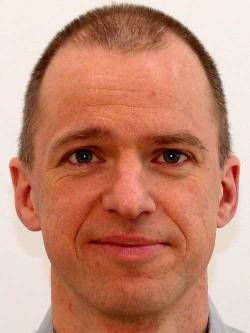Visitor number
since 2001-06-26
(hitmaster.de,
page statistics)
 Lutz Prechelt
Lutz Prechelt

Old office address:
Institut
für Programmstrukturen und Datenorganisation
Fakultät
für Informatik
Am Fasanengarten 5,
Universität Karlsruhe
76128 Karlsruhe
Germany
email: prechelt@ira.uka.de
Current home address:
Lutz Prechelt
Kilianstr. 18
70327 Stuttgart
Phone: +49/711/3808 104
Mobile: +49/163/6141500
 As of April 2000, I have left the university and joined
abaXX Technology in Stuttgart.
I am still reading my email sent to the university, though.
Before I left, the following information applied (except
for the list of publications, none of it is being actively
maintained any more):
As of April 2000, I have left the university and joined
abaXX Technology in Stuttgart.
I am still reading my email sent to the university, though.
Before I left, the following information applied (except
for the list of publications, none of it is being actively
maintained any more):
I am a senior research associate.
See information about my
Furthermore, I am the manager of the
University
Support Center (USC).
Here is my online
list of publications.
You find a few future appointments in my
plan file.
Several resources that I found interesting and/or important are in my
personal hostlist.

My Research Interests
Empirical work in Software Engineering
Most of my current research is concerned with empirically
testing and developing ideas in Software Engineering.
Much of this work takes the form of controlled experiments.
- How useful is the Personal Software Process (PSP) methodology?
Can specific differences in behavior, productivity, or product
quality be detected between programmers using a PSP and others?
[pspeTR,
pspe]
- Can PSP benefits be achieved without a PSP course? How?
[deflog]
- Which errors are made by programmers in different languages, different
work environments, after certain events, at different times of day etc.?
- Are run-time checked assertions (preconditions and
postconditions) really useful? Do they help during maintenance?
[assert]
- How, if any, does the depth of the inheritance tree of a program
affect maintenance?
[Inherit],
[InheritTR].
- How useful are design patterns for communication during design, for
program development, and for program maintenance?
[PatDocTR1],
[PatDoc],
[PatMain],
[Patseries]
- How can uses of design patterns be found in existing software
(reverse engineering)?
[PAT]
- How useful is automatic type checking in terms of productivity and
program quality?
[tcheck]
- Which tools
can/should be built to support the Personal Software Process (PSP)?
- How useful are inner-procedural refinements for program comprehension?
[Refine]
You can find short descriptions for some of these projects on the
Karlsruhe Empirical Software Engineering Research
Group (EIR) page.
In particular, we usually publish the experiment materials and the raw
data along with the results to simplify building upon our work by others.
We do this in the form of so-called
experiment packages.

Compilers for parallel computing
I am also working in compiler construction for parallel computers.
A pet idea of mine is what one might call the low-tech approach:
Seek opportunities where reasonable restrictions of the domain or
functionality allow for much better or much simpler solutions than
those commonly researched.
- One outflow of this idea is CuPit
[CupitTR],
a special-purpose language for
neural network learning algorithms. Employing a special-purpose
language allows for compiler optimizations that would not otherwise be
feasible for dynamically changing, irregular problem structures
[Cupit].
The idea was successful enough that we created a second
version of the language
[Cupit2TR]
and compilers for SIMD, SMP, and
sequential machines.
The SIMD compiler source code is available as a literate programming
document [CupitCompTR].
-
Another result is REAPAR, a system for automatic parallelization of
highly irregular recursive C programs on SMP machines
[reapar].

Neural Network learning algorithms
In the context of the CuPit work described above, I was concerned with
studying learning algorithms, in particular algorithms of the type
that changes the topology of the network during learning.
I have published results about
During this work, I found it useful to prepare and publish a
standardized benchmark collection
[Proben1], which is available
from the
Neural Bench Archive at CMU as
proben1.tar.gz (1.8 MB)
and also from
ftp://ftp.ira.uka.de/pub/neuron/.
This later led to a NIPS 1995 workshop on NN benchmarking, which in turn
resulted in the
NN benchmarking resources page.
Research methodology
I am also interested in research methodology, in particular the
experimental method in computer science. As a starting point some
colleagues and I assessed the state of experimental evaluations in computer
science publications and compared it with neighboring disciplines.
The results of this study were quite depressing; they appeared in the
Journal of Systems and Software in January 1995
[Expeval].
As a follow-up I did a similar investigation specifically for the
evaluations of published neural network learning algorithms.
The results were just as bad
[NNeval].
Fortunately, things appear to have improved since that time.
I am trying to help with this process by publishing
advice
and infrastructure
and by explicitly encouraging researchers to admit and publish their
failures, because we could learn more from them if they were described
explicitly as such instead of being disguised as successes (for
instance by not testing claims at all).
Therefore, I have founded the
Forum for Negative Results,
a permanent special section of the
Journal of Universal Computer Science.
One recurring idea in my research (although not really a
methodological one) is the idea of simplicity. I am always looking for
cases, where we can have 80 percent of the possible
benefits with only 20 percent or less of the cost or complexity
of other approaches.
[reapar],
[PAT], and
[deflog]
are examples of what may result from this attitude.
Other projects
When opportunities arise, I also do other projects sometimes.
For instance the following:
- A melody recognition interface
[Tuneserver].
- A system for finding plagiarisms in a set of programs
[jplag].
- Some work on cooperation, related to the prisoner's dilemma
[INCA].
- In an earlier life, I have worked on natural-language-based
retrieval from a knowledge representation system
[YAKR].

Teaching
(Of only local interest, therefore in German)
Derzeit habe ich keine Lehrveranstaltung geplant.

WWW services
There are a number of WWW information or service offerings that are
somehow related to me:
- Try out the TuneServer melody recognition
service. It recognizes about 10000 tunes from classical music.
(Sorry, the service is currently nonfunctional because the
university has now restricted the access to non-standard
network ports such as the one used by the recognition server.)
- If you teach university programming courses and fear your
students might cheat by copying their assignments from colleagues,
register for use of the
JPlag plagiarism detection system.
- You can find some (possibly useful) software tools
written or maintained by me on my software page.
In particular, you can get the C-Refine processor there, which
introduces the very useful inner-procedural refinement language
construct into C and C-like languages.
- From 1996 to 2000, I was the maintainer of the
v.f.h. home page (in German).
- Until July 1999, I was the maintainer of the local
Informatik-Mittelbauseite (in German),
now maintained by Oliver Rogalla.
Other things
In 1992, I founded the
FAQ file for comp.ai.neural nets and then was its maintainer
until December 1995.
I was the organizer of the "International Knobeln Contest", which was
conducted twice (in 1993 and 1994).
See an old
announcement, or
lots of material about the contest, including all results and software,
or the paper [INCA]
that describes how the interaction model underlying the Knobeln game
can be used as a model of interaction that avoids some of the deficiencies
of the popular prisoner's dilemma model.
And for all the brave who had enough endurance to read up to this point
here is a nice collection of
disclaimers which I found
on USENET over the years. (For best satisfaction I recommend
consumption in small doses.)
Comments, additions, and error reports for this document are welcome.
Send email to prechelt@ira.uka.de.
Now for the bumper-sticker section:





Last modified: Sun Jun 16 22:05:40 CEST 2002
 Lutz Prechelt
Lutz Prechelt

 Lutz Prechelt
Lutz Prechelt

 As of April 2000, I have left the university and joined
abaXX Technology in Stuttgart.
I am still reading my email sent to the university, though.
Before I left, the following information applied (except
for the list of publications, none of it is being actively
maintained any more):
As of April 2000, I have left the university and joined
abaXX Technology in Stuttgart.
I am still reading my email sent to the university, though.
Before I left, the following information applied (except
for the list of publications, none of it is being actively
maintained any more):



